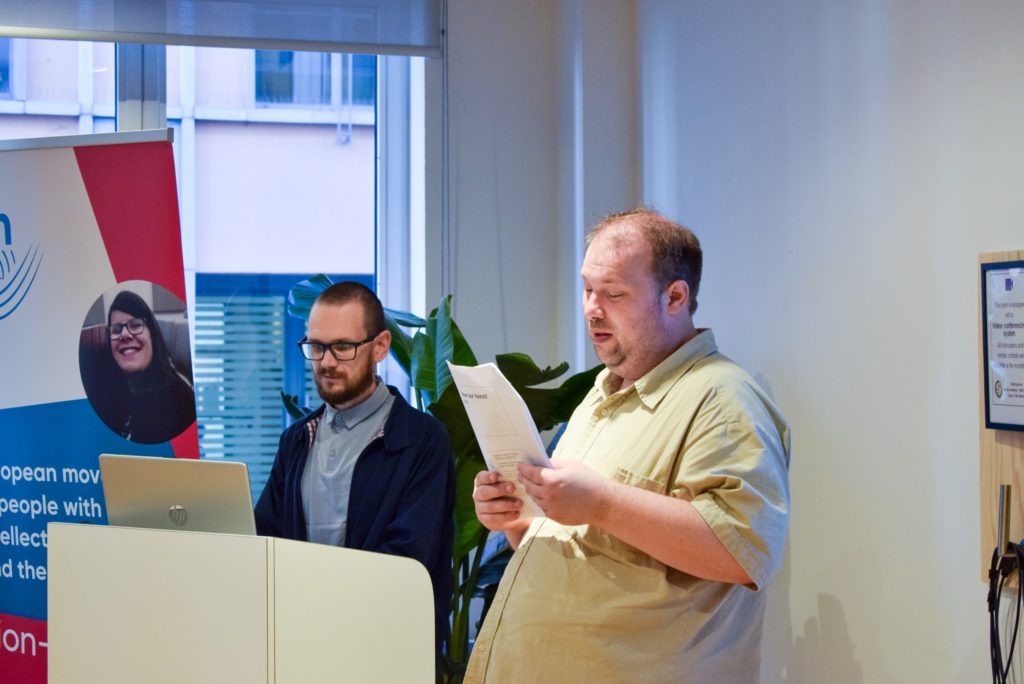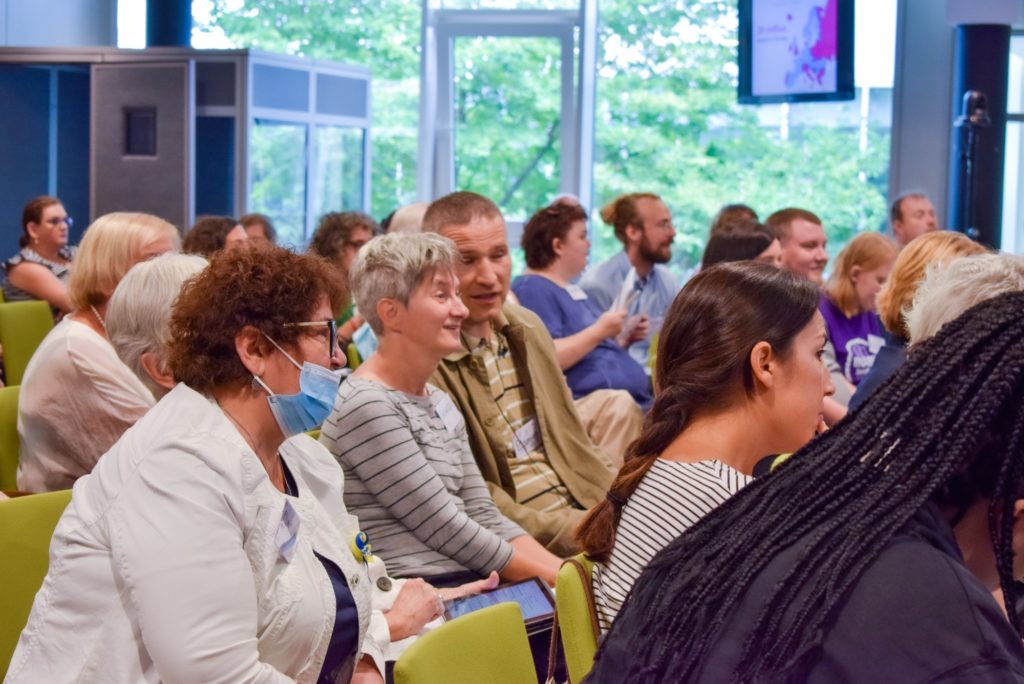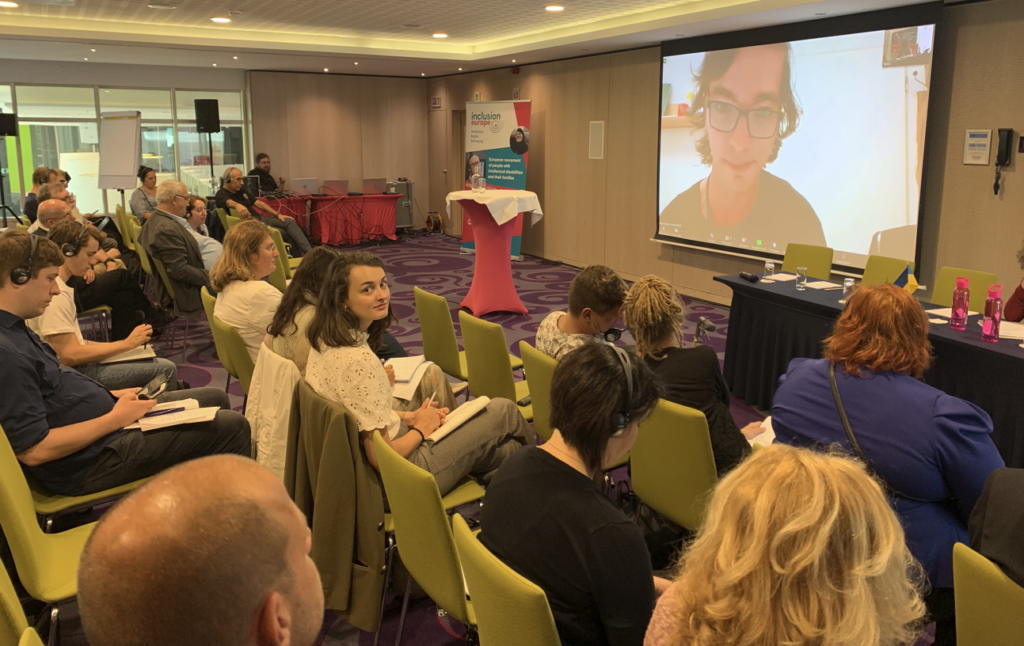Deinstitutionalisation in Czechia was a session during the Europe in Action to End Segregation conference. As part of the session:
- Czech deputy Minister of Labour and Social Affairs, Zdislava Odstrčilová, provided an overview on Czechia’s process towards deinstitutionalisation.
- Radek Rosenberger, head of social services of CSS Stod, spoke about the changes in services provided by this organisation.
- Milena Johnová, councillor for health and social affairs from the City of Prague, gave a presentation about the city where there are still many missing services, such as respite care, support for people with complex support needs. Milena spoke about recent closure of an institution run by Prague.
- Self-advocate Luláš Kudlička talked about his experience growing up in an orphanage, moving out of institutions, and establishing his own life.
- Jan Pfeiffer, who leads mental health reform at ministry of health care, talked about what changes are part of the psychiatric care reform.
Lázsló Bercse, vice-president of Inclusion Europe and chair of EPSA, talked at the end of the session to reflect on the presentations, and to share his views on the process of deinstitutionalisation in Czechia. This is the full version of László’s speech:

László Bercse speaks at self-advocacy session during Europe in Action conference
Dear colleagues,
I want to thank you for the information.
I think we could all learn a lot from you.
We could use a lot of the work in Czechia as a good example.
But we could also learn what needs to be done in a better way.
From what we heard, we know that Czechia has done a lot for deinstitutionalisation.
Thousands of people moved from large institutions to community-based services.
Several institutions were closed completely.
A lot of know-how and experience
I was happy to hear that now there are a lot of very good community-based services.
They can provide the know-how and share experiences with others.
There are many experienced and motivated people working on the changes.
Several regions are very active and do a lot to support deinstitutionalisation.
Lack of clear direction
But there is a lack of clear direction and coordination on the national level.
It would help the good practices and positive experiences of some regions to spread nationally.
There are around twelve thousand people with disabilities still in institutions.
They also need new types of services, which should not only mean new residential services.

Participants during the first day of the conference
Normal housing instead of residential care services
I think we should use already existing (or develop new) housing opportunities and support services, instead of building new small residential services.
I personally would find it very useful to introduce personal budgets.
To make sure people with disabilities can choose the best services for themselves.
Support services must be inclusive and available for everyone.
People with complex support needs must not be left in institutions.
We have to close all institutions!
Better use of EU funds
We have to use EU funds to continue developing support services, and achieve systematic changes.
We have to invest in trainings, including trainings for supporters, and raising awareness in local communities.
The better usage of EU funding is not only necessary in the Czechia, but in any other EU country.
So, the EU should more effectively monitor that EU funds are really used to support the inclusion of persons with disabilities.
The EU should give clear guidance to countries instead of stopping EU funding.
Stopping EU funding not only punishes governments, but also people with disabilities and their organisations.
It would be important as well not to use most of EU funds for building new residential services, but to refurbish normal housing, to rent apartments for people to live in.
People with disabilities should also be able to use their own properties as supported housing.

Self-advocate Lukáš Kudlička speaking (on screen) during the Deinstitutionalisation in Czechia session
Involve self-advocates in deinstitutionalisation
It is crucial to better involve self-advocates in the deinstitutionalisation process.
To hear their ideas, and make sure that their needs are really met.
The whole process should strengthen self-advocacy, so that people moving out from institutions can learn how to speak up for themselves.
This includes ending guardianship as well.
People moving out from institutions need to decide freely about where, with whom and how they want to live.
Always remember:
“We shouldn’t just build new houses. We need to build an inclusive society.”
Read more:
- Living freely and being members of communities like everyone else – László Bercse
- “Now I support others to get out of institutions”
- “Live a life of your own, get education and experience, get a job with proper money”
- “No institution can replace a proper family”
- “It didn’t take long before I knew that I wanted to leave the institution”
- End segregation campaign





